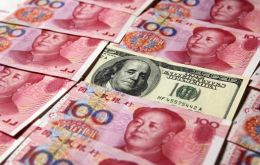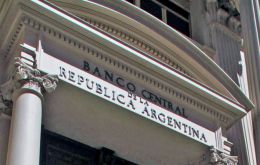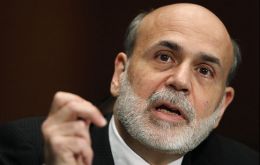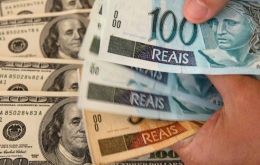MercoPress. South Atlantic News Agency
Tag: US dollar
-
Wednesday, July 5th 2017 - 01:15 UTC
Macri tries to calm down Argentines as US dollar goes up

Argentine President Mauricio Macri Tuesday said Argentines should “not worry about the dollar,” as the US currency rose 13 cents, closing at AR$ 17.18. It will “benefit regional economies and job creation,” he added during a radio interview.
-
Wednesday, January 11th 2017 - 07:32 UTC
Pound continued to slump on Tuesday; Dollar recoups waiting for Trump's media conference

The British Pound slumped lower on ongoing Brexit worries on Tuesday, while the US Dollar recouped some of its recent losses as investors wait for President-elect Donald Trump's first press conference Wednesday. While Trump's Twitter account has been active since he won the keys to the White House and given clues to his policies, Wednesday's press conference will give Trump the platform to explain his tax and spending plans.
-
Thursday, August 13th 2015 - 06:17 UTC
For third consecutive day China weakens the Yuan against the US dollar

The People's Bank of China (PBoC) weakened the Yuan against the dollar for a third consecutive day on Thursday, following reports the central bank intervened to stem the currency's sharp slide late on Wednesday. The PBoC set the Yuan fixing at 6.4010, compared to the previous day's close of 6.3870, sending the currency 0.7% lower to 6.43 per dollar in early trade.
-
Tuesday, March 3rd 2015 - 06:24 UTC
Dollar on Monday at an eleven year peak against major currencies

The dollar rose on Monday against major currencies touching an 11-year peak. The Euro, which has been in an extended slump, had been up by as much as a third of a percent against the dollar but surrendered gains and traded near unchanged at just under $1.12.
-
Wednesday, November 19th 2014 - 07:19 UTC
Short of dollars, Argentina appeals to China's Yuan to boost reserves

The Argentine Central Bank received this week the second part of a multi-billion dollar currency swap with China’s Central Bank, worth the equivalent of 508 million dollars. The swap allowed Argentina to bolster its foreign reserves, which rose 506 million and closed at 28.785 billion dollars.
-
Friday, January 17th 2014 - 08:05 UTC
US dollar keeps breaking records in Argentina; central banks reserves fall a further 100 million

The US dollar reached a new record high on Thursday as purchase pressure on the so called “blue” or informal market continues pushing the price which closed 35 cents up at 11.50 pesos for buyers and 11.55 pesos for sellers.
-
Thursday, February 14th 2013 - 23:29 UTC
IMF praises Venezuelan devaluation, but LechugaVerde/Bolivar gap close to 300%

The International Monetary Fund, IMF, praised Venezuela for the recent devaluation of its currency saying it is a positive attempt to reduce macroeconomic misbalances but also called on the government of President Hugo Chavez to continue eliminating the exchange rate distortions.
-
Wednesday, December 12th 2012 - 20:35 UTC
“Soft” dollar until US unemployment rate falls below 6.5% says Fed

The US Federal Reserve has said it plans to keep interest rates at close to zero at least until the US unemployment rate falls below 6.5%. The Fed previously had a date-driven target, rather than a data-driven one.
-
Tuesday, April 10th 2012 - 16:30 UTC
Brazil targets a dollar floor of 1.80 Reais and questions private banks attitude

Having a floor of 1.80 Real to the US dollar is no great thing, but it is a target to sustain said Brazil Development, Industry and Foreign Trade minister Fernando Pimentel referring to the latest announcements to promote Brazilian industry battered by a strong currency and massive inflow of ‘cheap’ imports.
-
Monday, December 12th 2011 - 19:26 UTC
Economists downgrade Brazil’s growth estimates for this year and 2012

Brazilian bank economists cut the country’s growth estimate for this year to below 3%, (2.97%) according to a last week survey by the Central bank of over one hundred institutions and which was released Monday.
